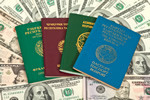Combining expat entrepreneurship with low tax rates

Combining expat entrepreneurship with low tax rates
Becoming a self-employed expatriate may well be the toughest move you’ve ever made, but the internet age is all about taking chances and making your dreams come true, no matter where you’re living at the time. Taking on a whole new country, its language, its culture and its way of life can open your mind and reveal the hidden strength essential for entrepreneurship. Setting up a business in Europe opens up perks including lower tax rates than in the UK as well as possibilities for development which may be stifled in the home country.
One popular destination for expats wishing to go-it-alone is Cyprus, considered a low-cost tax hotspot for budding entrepreneurs. If you’re earning less than 20,000 euros in your first year, you don’t pay any tax at all, whilst those who’re settled in, doing well and earning over 60,000 euros pay just 35 per cent. The island is becoming popular with online business owners, including those involved in forex, digital services and even gambling!
Estonia became an EU member state just 14 years ago and encourages expats wishing to start their own businesses provided they have a winning plan and around 16,000 euros in start-up capital. EU citizens only need to turn up and get on with the job due to the EU’s freedom of movement ruling. Personal income tax stands at 20 per cent compared to its neighbour Finland’s 51 per cent! The only downside is the Estonian winter, offering just six hours of daylight and temperatures of well below zero.
If low tax rates are essential to your business plan, they don’t get much lower than the Czech Republic’s 15 per cent. The country isn’t just Prague, with a number of attractive smaller cities happy to welcome expat entrepreneurs and the cost of living is refreshingly low. Romania is another strong possibility, with 32 per cent of its population self-employed and fledgling entrepreneurs taxed at just three per cent. Opening a bank account is straightforward, but the one downside for tech expats is that it’s not yet well-known as a technical hub. Miniscule Montenegro has the worst internet speeds in Europe, but it’s central to the rest of Europe and its personal income tax rate is a healthy nine per cent.
Related Stories:
- Expats find peace in the covid-19 refuge of Dahab town - July 20, 2020
- Expats in Malaysia still banned from overseas travel - July 17, 2020
- HSBC Asia to cut back on internal expat relocations - July 16, 2020
- China hits its expats with 45 per cent tax on overseas earnings - July 15, 2020
Latest News:
- Tips on a trouble-free relocation as an expat overseas - July 20, 2020
- Expats find peace in the covid-19 refuge of Dahab town - July 20, 2020
- Is Kuwaitization the unintended result of the oil price crash? - July 20, 2020
- Expats unhappy abut changes to Korean points-based visa system - July 17, 2020
- Chiang Mai and Bangkok no longer bargain locations for expats - July 17, 2020
- Expats in Malaysia still banned from overseas travel - July 17, 2020
- Vietnam welcomes expats to its safe, affordable lifestyle - July 16, 2020
- Asian tiger economies reach out to expats in Hong Kong - July 16, 2020
- HSBC Asia to cut back on internal expat relocations - July 16, 2020
- Tips on integrating for newly-arrived expats - July 15, 2020


